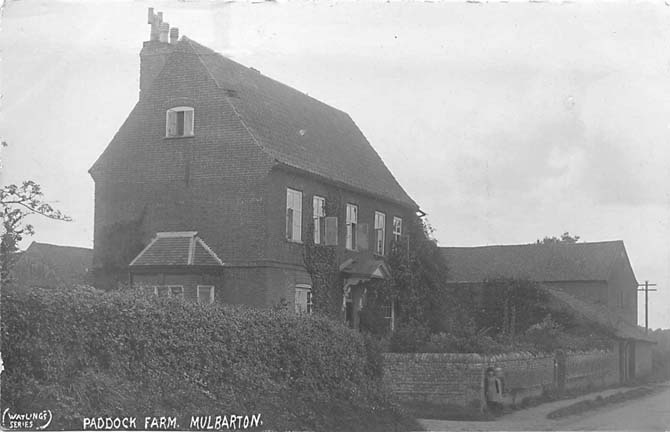Paddock Farm 1850-51
Mr Turner's Farm 1850-51
After James Turner (1805-1850) died, meticulous accounts were kept by his son, also called James (1834-1889) whilst his father's estate was being settled. This gives us an interesting picture of Paddock Farm, Mulbarton, in the financial year 1850-51.
OUTGOINGS
WAGES
Mr. Turner employed a number of men and boys on a regular basis, with some extra men and a number of women on a casual basis. There were also women employed in the house. Wages for a typical full week are as follows:
John Baldwin 6 days labour 8/- (8 shillings)
Charles Wiseman 6 days labour 8/- (8 shillings)
Edward Kedge 6 days labour 8/- (8 shillings)
R Tirrell 6 days labour 8/- (8 shillings)
W Leach 6 days labour 8/- (8 shillings)
James Caisey 6 days labour 8/- (8 shillings)
James Sleight 6 days labour 8/- (8 shillings)
Robert Huggins 6 days labour 7/6 (7 shillings & 6 pence)
James Williams 6 days labour 3/- (3 shillings) (also called 'boy James')
Andrew Spratt 6 days labour 2/6 (2 shillings & 6 pence) ('boy Spratt')
In the autumn,
other lads are taken on:
Boy Larter 6 days labour 3/- (3 shillings)
Boy Emms 6 days labour 3/6 (3 shillings & 6 pence)
Boy Stackyard 3½
days work 1/9 (1 shilling
& 9 pence)
Work includes turnip hoeing, work in the garden, planting,
At harvest, when they are working much longer hours, all the men receive £1 and the boys receive double wages at the start of the harvest. At the end of the harvest they receive the balance due to them. On Sept. 6th 1850 this was £2.17s.0d per man and small amounts extra for the boys.
Any expenses incurred by the men for a special job they are asked to do are refunded.
Women earned
less for farm work:
Woman Albro' for 3¼ days threshing 2/6d
Mrs. Bailey for 4 days in barn 3/-
Mrs. Kedge for 3 days in barn 1/9
Woman Kedge harvest wages 2/-
The Kedge children were paid 6d (sixpence) for 'dropping beans'
In October
1850, women working in the house were paid:
Hannah Cook £1. 16s. 8d (not told how long for)
Susan Minns £1. 15s. 4d
Other expenses
People seem to
be paid for skilled work as needed:
April Mrs. Blake, dressmaking 9/6d
April Carman, drilling 11+ acres barley 11/6d
July C. Wiseman, mowing hay 18/4d
Aug. Rice, thatching 3 hay stacks £1
Aug. Casey, 4 days harvest work 12 shillings
Sept. Casey, 5 days harvest work 15 shillings
(presumably extra labour to help the
regular workers)
Sept. John Rice, Thatching bill £4
Nov. Carpenter, 8 days work 16 shillings
Nov. Mr. Rice, Blacksmith £5. 5s. 10d (accumulated bill)
Jan. Bricklayers bill £2. 9 shillings
Dye, rubbish collecting 2 shillings
Household expenses include:
Grocery bills
from Mrs. Todd - around 10 shillings a month
Occasional food
bills:
R Blake,
butcher's bill (e.g. £4 in July)
Girling, pork
butcher, for pork and sausages and suet (e.g. 6/8d in Sept)
Fish at
Norwich, 5/- (occasional)
Coal during
winter (10 shillings for half a ton)
Medical bills: Mrs. Fillbank, the Nurse 3 weeks £1. 5shillings
Doctor's bills (from
Norwich) 7/6d a time
Other personal
expenses:
Sept. Bill for tobacco 1 shilling
Wright,
shoemakers £1. 5s. 6d
Mercury Office
Papers £1. 1s. 0d (= 1 guinea)
Jarrolds,
booksellers, £1. 13s. 0d
(but most of
these will come under the entry 'small cash items' for most months)
Farm expenses
include bills for seeds; repairs; milling wheat; mending sparrow nets (2
shillings); 'muck' (10 loads = £2. 10 shillings); a cockerel (2 shillings);
collar for pony (1/6d)
3 Saturdays
market expenses 15 shillings
6th
July Beer for hay makers 2 shillings
30th
July 5 score (= 100) sheep 12/6d
(lambs to fatten up)
Then there were
the occasional special purchases at auctions. In October 1850, Mr. Turner
bought a lot of items at such a sale:
Water trough 8/6d
Gang harrow £3
Gig (a light
carriage) £5. 15shillings
Harness £2. 4 shillings
Horse £21
And at another
sale he bought a looking glass (9 shillings) and a watch (5 shillings)
Taxes are major outgoings:
Half-year
taxes: £3. 12s. 2d
Half-year land
tax: £8. 9s. 0d
Quarterly poor
rate: £8. 1s. 4d
And a further (anon.) tax of £2. 15s. 0d
INCOME
Items sold
off the farm
Butter and eggs
(to Mr. Girling and to Mrs. Todd)
Wheat sold to
Mr. Cremer at Mulbarton mill, for flour (e.g. 80cwt. for £74; and a similar
amount a few weeks later)
Corn sold to
Mr. Cremer (miller)
Oats sold to Mr.
Todd (at World's End - where horses were stabled)
Hay to Mr.
Cremer
Straw to Mr.
Cremer
Turnip seed
(unspecified amount for £3. 15 shillings)
Pigs, to
Charles Wiseman or R. Girling - e.g.
6 pigs for £14. 9s. 6d; 1 fat pig for £2.10
Sheep, to Mr.
Girling - e.g. 1 sheep £1. 15s. 6d
1 calf to Mr.
Girling for 10 shillings
'Beasts'
(cattle) - e.g. 8 sold at £17 each.
(In July 1851,
he sold 4 shorthorn bullocks at Smithfield Market, London for £68, and the
following week another four for £64)
1 pony sold for
£12
Horse hide to
Mr. Cunningham (for 5 shillings)
Cow hide to Mr.
Turner for 5/6d
Faggots, wood,
parsnips to his own workers for small amounts
Rents and tithes
These form a
major part of his income - some are rented to his own workers. The annual rent
is due at Michaelmas (end of September)
D. Spurgeon £6 rent; 2/6d 'tythe'
Robert Girling £21 rent;
James Sleight £4. 15 shillings rent; 1/6d tythe
(compare this with his wages, 8
shillings a week, given above)
Ben Chapman £5 rent; 1/6d tythe
There also seem
to be regular payments from a couple of people.
(N.B. names of tradespeople can be checked against White's Directory, 1845)
